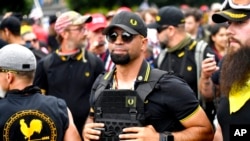Henry “Enrique” Tarrio, the charismatic former head of the far-right Proud Boys, was sentenced on Tuesday to 22 years in prison for his involvement in the Jan. 6, 2021, attack on the U.S. Capitol, the longest penalty imposed so far for the deadly riot.
Tarrio’s sentence, handed down by U.S. District Judge Timothy Kelly in Washington, surpassed the previous harshest punishment meted out on January 6 defendants: 18 years for Oath Keepers founder Stewart Rhodes in May and Proud Boys leader Ethan Nordean last week.
Tarrio, Nordean and two other Proud Boys leaders, Joe Biggs and Zachary Rehl, were convicted in May of seditious conspiracy for plotting to storm the Capitol, stop Congress from certifying the 2020 presidential election, and keep then-President Donald Trump in power. A fifth defendant, Dominic Pezzola, dodged the seditious conspiracy charge but was found guilty of other counts.
The Jan. 6 attack injured nearly 140 police officers guarding the Capitol and was blamed for the deaths of five people. More than 1,100 Trump supporters have been charged in connection with the assault, many for minor offenses, with hundreds of others still being sought by the FBI.
Although Tarrio was not at the Capitol during the bloody melee, prosecutors say he was the architect and “primary organizer” of the plot, directing the attack from outside Washington and later boasting about it.
“Make no mistake … we did this,” Tarrio wrote in an online message to a close-knit group of top Proud Boys leaders.
The Justice Department had recommended 33 years for Tarrio, saying the “naturally charismatic leader” of the Proud Boys used his influence over subordinates “to organize and execute the conspiracy to forcibly stop the peaceful democratic transfer of power.”
"To Tarrio, January 6 was an act of revolution," prosecutors wrote, seeking to add a “terrorism enhancement” to his sentence.
Seeking leniency, Tarrio’s lawyers denied their client contacted or directed the Proud Boys on Jan. 6. They also cited Rhodes’ 18-year sentence to argue for no more than 15 years.
Before the sentence was handed down, an emotional Tarrio addressed the court, apologizing to his family, members of law enforcement, lawmakers, and residents of Washington for the events of Jan. 6, saying there was “no place for political violence” in the country.
“I pray for unity for this entire country,” he said.
But Kelly, who presided over the Proud Boys trial and sentencing, wasn’t persuaded by Tarrio’s display of contrition or effort to distance himself from the Jan. 6 attack.
“I don't have any indication that he is remorseful for the actual things he was convicted of,” Kelly said before he sentenced Tarrio.
The trial, Kelly said, established that Tarrio was “the ultimate leader” who had “an outside impact on the events of the day.”
The attack of Jan. 6 disrupted the country’s long-standing tradition of the peaceful transfer of power, Kelly said.
What happened on Jan. 6 “was extremely serious and a disgrace,” he said.
The Proud Boys, a self-described “pro-Western fraternal organization for men who refuse to apologize for creating the modern world,” were among Trump’s most ardent supporters during the 2020 election campaign.
After Trump lost the election to President Joe Biden, the Proud Boys played “a significant and often violent” role in Washington rallies organized by supporters of the former president. During a December 2020 rally, Tarrio allegedly set a stolen Black Lives Matter flag on fire, leading to his arrest the following month.
As prosecutors described it during trial, the group began mobilizing for the Jan. 6 attack just hours after Trump called on his supporters in a December 19, 2020, tweet to come to Washington for a rally, saying it “will be wild.”
The Proud Boys took that as a call to arms, prosecutors alleged.
To plan and prepare for Jan. 6, the day Congress was to certify the election results, Tarrio assembled a group of comrades that he dubbed the "Ministry of Self Defense."
Under the guise of organizing protests, the group acted as "a violent gang that came together to use force against its enemies," prosecutors said.
The Proud Boys were among the first rioters to enter the Capitol, forcing lawmakers to flee and disrupting the congressional certification of Biden’s victory.
In court documents, prosecutors wrote that Tarrio viewed the Capitol breach as “a justified attack on the government” and that he used his influence as chairman of the Proud Boys to “organize and execute” the attack.
Attorneys for Tarrio, emphasizing that Tarrio wasn’t present at the Capitol on Jan. 6, denied that he directed his followers to attack the building and instead directed two lieutenants – Biggs and Nordean – to orchestrate the attack. They also accused prosecutors of using Tarrio as a scapegoat for Trump.
The attack of Jan. 6 led to U.S. House to impeach Trump for inciting the mob. However, he was acquitted by the Senate.
In early August, Trump was indicted on four felony charges for conspiring to reverse his election loss in the run-up to the January 6 riot. The charges are different from those leveled against the Proud Boys and the Oath Keepers.
The four-count indictment by a federal grand jury in Washington accused Trump of spreading lies about the election in an attempt to obstruct a “bedrock function” of American democracy.
Trump, who is the front-runner for the Republican presidential nomination, has pleaded not guilty and blasted the prosecution as a politically motivated attempt to undermine his run for the White House.




